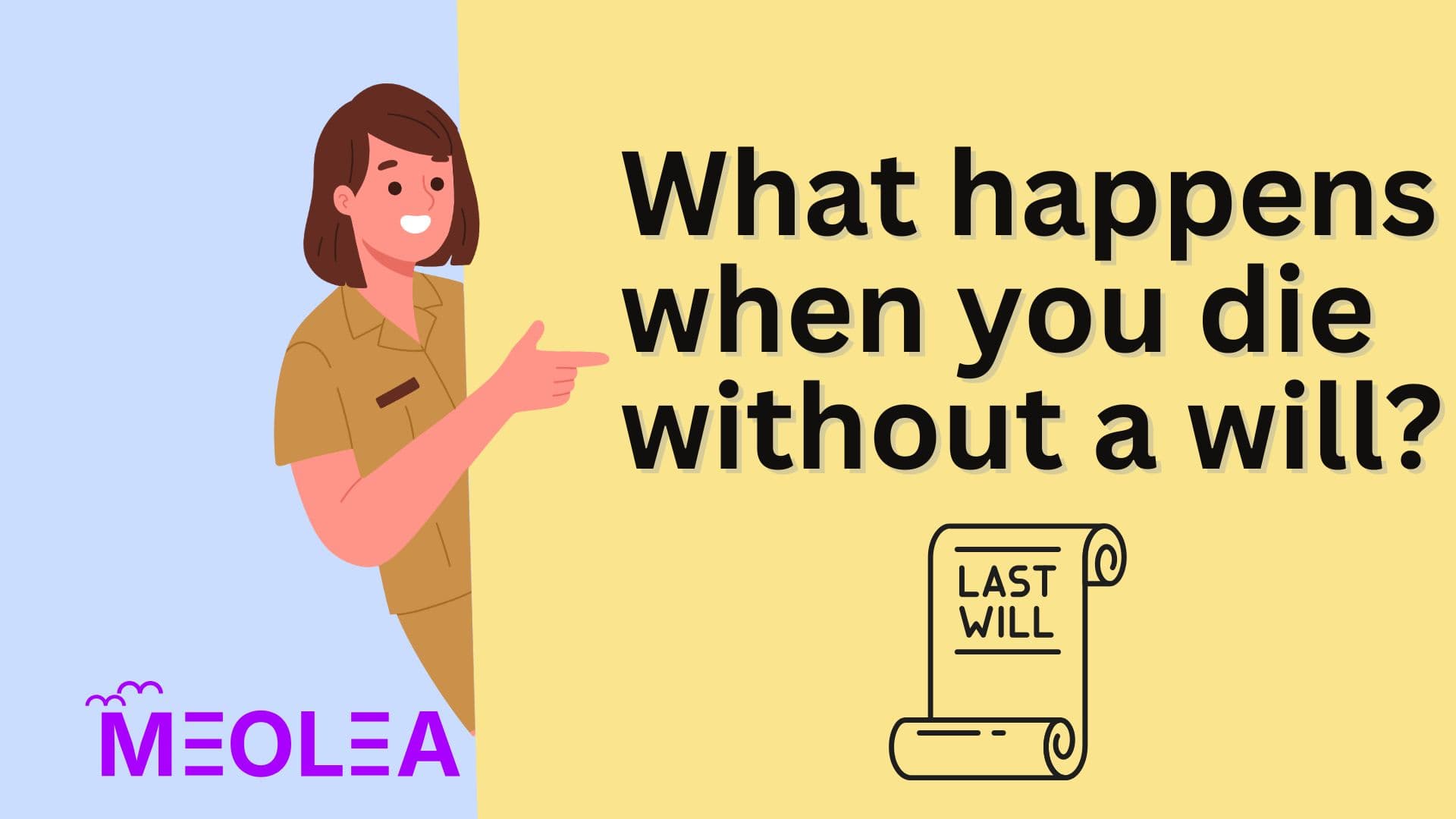
If you die without a will — legally known as dying intestate — this leaves your assets, your family, and sometimes your legacy at the mercy of default laws. These laws vary by country and even within countries, like in the U.S. or Germany, and they often don’t reflect what you would have wanted.
Without clear instructions, the state decides:
- Who inherits your money, home, and belongings.
- Who becomes the guardian of your children.
- Who manages the legal process of wrapping up your affairs.
This can lead to long delays, family disputes, frozen accounts, and unnecessary costs. In Germany, for example, the inheritance may even fall back to the state (Aneignung durch den Staat) if no eligible heirs are found. In the UK or the U.S., estranged relatives might inherit everything while close partners are left with nothing.
This article breaks down what happens if you die without a will, with practical examples and clear next steps — so you can protect your loved ones, even after you’re gone.
What Is Intestacy? (Dying Without a Will Explained)
The term intestacy describes the legal situation when someone dies without a valid will. In this case, national or regional inheritance laws determine how assets are distributed, regardless of personal wishes or family dynamics.
While the word may sound like legal jargon, its consequences are very personal.
Here’s what intestacy means in different countries:
- United States: Each state has its own intestacy statutes. These laws define a strict order of inheritance: spouse > children > parents > siblings > more distant relatives. If no relatives are found, the estate goes to the state (escheat).
- United Kingdom: The rules of intestacy follow a predefined list: spouse or civil partner, then children, then parents or siblings. Unmarried partners are not entitled to inherit under UK intestacy law, even if they lived together for decades.
- Germany: The gesetzliche Erbfolge (statutory inheritance law) follows a parentel system, dividing heirs into orders (first = children, second = parents and their descendants, third = grandparents, etc.). Spouses inherit alongside relatives depending on marital property regimes (e.g. Zugewinngemeinschaft).
📌 Important: No matter where you live, dying without a will removes your voice from the process. Even digital assets and personal wishes (like funeral preferences) may be completely ignored.

Who Inherits If You Die Without a Will?
Here are some examples from different countries that show who inherits what if you die without a will:
🇺🇸 United States: State Law Determines the Line
In the U.S., inheritance without a will depends entirely on your state’s intestacy laws. But most states follow this general order:
- Spouse (may share with children from a previous relationship)
- Children
- Parents
- Siblings
- Extended family
- The State (as a last resort)
Example: If you die in California with no will and are married with two kids, your spouse and children split your estate. But if you have a child from a previous partner, the split becomes more complex.
🇬🇧 United Kingdom: Strict Rules, No Room for Emotion
Under the UK’s rules of intestacy:
- A spouse or civil partner inherits the first £322,000 (as of 2024) and half of the remaining estate.
- Children share the other half equally.
- If no spouse or children, the estate goes to parents, then siblings, etc.
Important: Unmarried partners, stepchildren, and close friends inherit nothing — unless named in a will.
🇩🇪 Germany: The Parentel System in Action
Germany uses a structured “parentel” approach:
- 1st order: Children and grandchildren
- 2nd order: Parents and their descendants (siblings, nieces, nephews)
- 3rd order: Grandparents and their descendants
Spouses inherit a portion based on the marital property system:
- Under the default Zugewinngemeinschaft, the spouse gets 1/4 to 1/2 of the estate, depending on who else is entitled.
🏛️ Example: A married person with two children who dies intestate in Germany leaves 1/2 to the spouse and 1/4 to each child.
What Assets Don’t Go Through Probate? – Why They Matter
Not everything you own has to go through a long legal process after you pass away. Some things are passed on automatically — even without a will. These are called non-probate assets, but let’s keep it simple:
These types of assets usually don’t get stuck in legal delays:
- ✅ Joint accounts (like a bank account shared with your partner)
→ The other person usually gets the money automatically. - ✅ Life insurance or pensions with a named beneficiary
→ The money goes straight to the person you listed. - ✅ Property with a co-owner (like a house you own “jointly”)
→ The other owner may automatically inherit your share, depending on how it’s registered. - ✅ Accounts with “payable on death” or “transfer on death” settings
→ These are often available for bank or investment accounts — no court involved.
📌 Tip: If you want to keep things simple for your family, make sure these assets have the right people listed. It’s one of the easiest ways to avoid headaches later.

What Can Go Wrong Without a Will? (Real-Life Pitfalls)
When there’s no will, real-life problems often follow. These aren’t just legal issues — they’re personal and painful.
Not having a will isn’t just a legal issue — it can create real problems for the people you leave behind. Even if you don’t have a big estate, small misunderstandings can turn into big heartbreaks.
Here are a few things that can (and often do) go wrong when there’s no will:
🧩 No one’s officially in charge
Without a will naming someone responsible, the court has to appoint an administrator — and that can take time and cause friction.
🧍♀️ Your Partner Might Get… Nothing
If you’re not married or in a civil partnership, the law often doesn’t recognize your relationship — even if you’ve lived together for years. That means your partner might have no legal right to your home or savings.
Example: Julia lived with her partner for 18 years. They raised kids together. But when she passed away without a will, her estate went to her siblings — not her partner.
⏳ Assets are frozen
Your bank accounts and property may be locked for months while the court decides who gets what.
💸 There are legal costs
Court fees and paperwork eat into what your loved ones receive. If lawyers get involved, it gets even more expensive.
👧 Your kids’ future could be unclear
If you have young children, the court decides who becomes their legal guardian. Without your clear wishes, it may not be the person you would’ve chosen.
Tip: A will lets you name guardians for your kids — giving you peace of mind and avoiding family disputes.
🏡 Your House Might Be Sold
If your assets are tied up in probate and your loved ones don’t have access to your accounts, they might struggle to pay the mortgage or bills — and may have to sell your home sooner than they’d like.
💔 Family Conflicts Can Arise
When there’s no plan, people are left guessing. That’s when arguments start. Who gets your jewelry? Your pets? Your photos? A simple will can help avoid hurt feelings and keep families together.
✅ The Bottom Line
Without a will, even the best families can end up in stressful, messy situations. But with just a little planning, you can:
- Choose who inherits what
- Name a guardian for your kids or pets
- Prevent delays, costs, and legal headaches
At Meolea, we’re here to help make this process as simple, safe, and human as possible — so your loved ones are protected, and your wishes are respected.
❤️ Meolea Makes This Easier
We help you create a clear, kind, and legally safe plan.
No lawyers. No stress. Just peace of mind — for you and your loved ones.
How to Avoid All This: Make a Simple Plan
The good news? Avoiding intestacy is easy — and it doesn’t require a lawyer or complicated paperwork.
Making a will (or basic estate plan) is one of the most loving things you can do for the people you care about. It gives them clarity, comfort, and peace during one of the hardest times in life.
Here’s how to get started — even if you don’t feel “ready.”

✍️ Your Simple 5-Step Checklist
1. List What You Own
Start small. Think about your home, bank accounts, savings, car, personal items, and anything meaningful (like heirlooms or your dog’s favorite blanket). You don’t need to be rich to make a plan — every item matters.
2. Decide Who Gets What
Who would you want to receive your things? A partner, child, sibling, friend, or charity? Write it down — even if it’s not formal yet.
💡 Bonus tip: Think about special items like jewelry, photos, or family mementos. These often cause the biggest arguments if there’s no clear instruction.
3. Choose Someone You Trust to Handle Things
This is the person (called an “executor” or “administrator”) who will take care of your estate. Pick someone organized, fair, and calm in tough situations.
4. Name a Guardian for Children or Pets
If you have young kids or pets, you can name someone to care for them. This is especially important if you’re a single parent or live with a partner who’s not a legal parent.
5. Make It Official
You can start with a handwritten will in some countries, but it’s safest to follow your local rules — especially for signatures and witnesses.
🛡️ With Meolea, we guide you step-by-step and help you store your wishes safely, so they’re available when your loved ones need them.
❤️ Final Thought: It’s Not About Death — It’s About Love
Planning for the end of life isn’t morbid. It’s a gift of clarity, kindness, and care. You’re not just protecting your assets — you’re protecting your people.
Meolea makes it easier than ever to start.
Meolea makes End-of-Life Planning and Legacy Management super simple! In 5 minutes you can start making preparations and invite your family members.